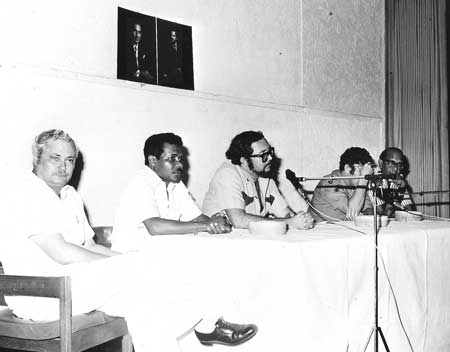


Income support is not a right under the Social Security Act which was created during the one-party state. In fact it was the DP coalition government under President Mancham which first mooted the idea of a social security system in the First National Development Plan 1977-81. The idea at the time was to convert the existing National Provident Fund – which was only a mandatory saving scheme for salary earners, into a fully fledged social security system on the British model. A consultant from the International Labour Organisation (ILO) arrived in 1978 to hold consultation with the stakeholders.
The original social security system introduced soon afterwards was a far cry from the current animal, which was introduced in 1987. Prior to 1987 the income of the fund was derived from a tax of 5% of the gross salary topped up by a tax of 10% of the same gross salary but paid by the employer. In 1987, however, the then Principal Secretary of Finance the late Guy Morel, came up with the hare brain idea of abolishing income tax on salaries and introduced in its place a graduated social security tax which the employer has to pay, based on the salary of the employee. The main reason for this move was to deflect the growing unpopularity of the Pay-As-You-Earn (PAYE) income tax deductions on salaries. 1987 was also the year that the decline of the economy, which started in 1980, started to impact on the standard of living of the workers in a workers’ paradise. For the SPPF, given the constant propaganda being churned out on television, of how the workers never had it so good, to take money from them especially was tantamount to taking food from a child’s mouth, since in reality their income was buying less and less. For former President Albert Rene, it also at the same time consolidated his capitalist bashing credentials by making them pay more for the welfare of the workers.
Guy Morel was an accountant not an economist. Whilst the move did not change the arithmetic of the fund, since the graduated tax paid by the employer mimicked the PAYE deductions of the employee, it had, in practice, a catastrophic effect on employment and incentives to reward employees. Under the new arrangement, every 10% increase in the salary of an employee resulted in a minimum increase of 18% on the cost of wages for an employer. As a result, since then, despite declarations of salary revisions by the government, the private sector never followed suit. Even the government eventually stopped making overall salary revisions. If it needed to reward an employee, it simply created a new post with a fancy title to justify the new salary while the task remains the same. As a result the average monthly salary of the 1153 of civil servants working in Public Administration is 121% higher than the average salary of the 3900 health workers (nurses?) and 23% higher than the average salary of the 2500 education (teachers?) employees.
In fact, there is no provision in the Social Security Act for income support, just as there is no provision under the Act for the government to take out millions of rupees each year from the fund to pay for the budget. Indeed, the Government does not, in practice, take money out. It simply keeps back the money it should pay into the Fund as an employer together with the deductions taken out of the salaries of employees. Admittedly R200 is a 50% increase on R400. But it still far short of the needs of many families surviving on the government’s own declared “minimum level of per capita expenditure” of R841 to keep one head out of absolute poverty. It means that JJ has failed to fulfil the constitutional obligation on the government in the
ARTICLE 3: THE RIGHT TO SOCIAL SECURITY
The State recognises the right of every citizen to a decent and dignified existence and with a view to ensuring that its citizens are not left unprovided for by reason of incapacity to work or involun¬tary unemployment undertakes to maintain a system of social security.